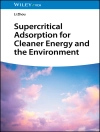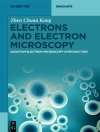The series Topics in Current Chemistry Collections presents critical reviews from the journal Topics in Current Chemistry organized in topical volumes. The scope of coverage is all areas of chemical science including the interfaces with related disciplines such as biology, medicine and materials science. The goal of each thematic volume is to give the non-specialist reader, whether in academia or industry, a comprehensive insight into an area where new research is emerging which is of interest to a larger scientific audience.
Each review within the volume critically surveys one aspect of that topic and places it within the context of the volume as a whole. The most significant developments of the last 5 to 10 years are presented using selected examples to illustrate the principles discussed. The coverage is not intended to be an exhaustive summary of the field or include large quantities of data, but should rather beconceptual, concentrating on the methodological thinking that will allow the non-specialist reader to understand the information presented. Contributions also offer an outlook on potential future developments in the field.
The chapter ‘Mechanochemical Forces as a Synthetic Tool for Zero and One-Dimensional Titanium Oxide-Based Nano-photocatalysts’ is available open access under a CC BY 4.0 License via link.springer.com.
İçerik tablosu
Waste-derived materials: Opportunities in photocatalysis.- Mechanochemical forces as a synthetic tool for zero and one-dimension titanium oxide based nano-photocatalysts.- Improvements in catalyst synthesis and photocatalytic oxidation processing based on the use of ultrasound.- Ferrite Materials for Photoassisted Environmental and Solar Fuels Applications.- Characterization of Photo-catalysts: from Traditional to Advanced Approaches.- Photocatalytic Approaches for Hydrogen Production via Formic Acid Decomposition.- Limitations and prospectives in wastewater treatment by UV and visible light active heterogeneous photocatalysis: a critical review.- Photocatalytic Reactor Modelling. Applications to Advanced Oxidation Processes for Chemical Pollution Abatement.
Yazar hakkında
Mario J. Muñoz-Batista is Assistant Professor from Departamento de Quimica Organica at Universidad de Cordoba. He has received his BA (Chemical Engineering) from CUJAE, Havana and MS and Ph D in Applied Chemistry (2015) from Universidad Autónoma de Madrid – Instituto de Catálisis y Petroleoquímica (CSIC). After two years as a postdoctoral researcher in the Instituto de Catálisis of CSIC, he joined the group FQM-383 lead by Prof. Rafael Luque as a postdoctoral research with a Juan de la Cierva scholarship and them he was promoted to Assistant Professor in 2018. His research interests focus on development and characterization of new catalytic/photocatalytic materials, gas phase batch/flow catalytic reactions, waste valorization and light-matter interactions and reactor modelling.
Alexander Navarrete Muñoz graduated from The Universidad Nacional de Colombia as Chemical Engineer and earned his Ph D from the University of Valladolid (Spain) in 2010. Throughout his research he has developed and patented novel processes for energy storage and valorization of CO2 and biomass residues. As researcher at Karlsruhe Institute of Technology (KIT) he is in charge of the integration of renewable energy and catalytic conversions by means of novel chemical reactor concepts. One of such concepts is a new kind of microreactor that uses solar energy for CO2 photocatalytic transformations based on plasmon phenomena. He is interested in the development of new materials and devices that capture and store renewable energy.
Rafael Luque is Full Professor from Departamento de Quimica Organica at Universidad de Cordoba, where he graduated in 2005. Prof. Luque leads the group FQM-383 at UCO, published ca. 370 publications, filed 3 patent applications and edited 10 books as well as numerous contributions to book chapters and invited, guest, keynote and plenary lectures in scientific events worldwide (>100). Prof. Luque is Edit^10). Research interests from the group focus on the development of benign-by-design methodologies for nano/bio/photocatalyst preparation and their applications in catalysis, energy conversion and storage, flow chemistry and biomass/waste valorization. Prof. Luque was also recently appointed as Head of the Scientific Center for Molecular Design and Modern Organic Chemistry for the Medicinal Industry at RUDN University in Moscow (Russia).












